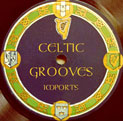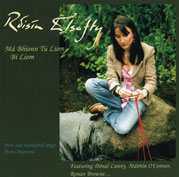ROISIN ELSAFTY: MA BHIONN TU LIOM BI LIOM
Roisin Elsafty: vocals
Ronan Browne: flutes, whistle
Mairtin O'Connor: accordion
John McSherry: low whistle
Donal Lunny: guitars, bouzouki, bodhran, keyboards, vocals
Siobhan Armstrong: wire-strung harp
Graham Henderson: keyboards, harmonium
Hassan Elsafty: Egyptian tabla
Naisrin and Zahrah Elsafty: vocals
Seosamh O'Neachtain: dancing
Ever since I listened to the obscure 1996 French release "Ireland: The Art of Sean-Nos," I have been wishing for a solo recording by Roisin Elsafty, and listening to it now I can say that the wait was worthwhile. Born in Connemara the daughter of well-known sean-nos singer Treasa Ni Cheannabhain, who was also featured on the 1996 CD, and of an Egyptian doctor established in the West of Ireland, Elsafty truly has one of the most beautiful voices in Ireland today--and that's no mean feat considering the number of good singers around. It's not only that she is a technically superb sean-nos stylist, but for me it also has to do with the apparent ease with which she can alter the timbre of her voice to suit the music or subject matter. On lullabies like "Seoithin Seo" and "Ho-bha-in," Elsafty's voice sound almost child-like, while on others the purity of her long-held notes is reminiscent of the great British-Indian singer Sheila Shandra. Her powerful delivery can also evoke Joan Baez at her full-throttle, militant best, while on the John Spillane song "Poor Weary Wanderer" Elsafty can shade her voice anew and reinvent herself as a modern songstress. Although the list of musicians involved might suggest that the album is over-produced, thankfully this is not the case. Elsafty sings unaccompanied on some of the great sean-nos classics, "Eleanor a Run" and "Roisin Dubh" for instance, all of them perfect vehicles to reveal her mastery of the Connemara style. When instrumental accompaniment is added, it is usually fairly light and always tasteful and appropriate. With their jig rhythm, the opening track "Pota Mor Fatai" as well as "Mo Cheallachin Fionn" are well-suited to the very effective interplay between O'Connor's accordion and Lunny's bouzouki. The ancient song "Sile Bheag Ni Chonnallain," rescued from the Bunting manuscripts, has a wonderful and most appropriate backing on a wire-strung harp which is a replica of the well-known Trinity College instrument. The most heavily arranged track is "Ali: Dilleachtin gan bhri," and anti-war song written by Elsafty's mother Treasa for an orphaned victim of the Iraq war, with lyrics in both Gaelic and Arabic. A remarkable album.
Rating: **** 1/2
Price: $27.99

 Recommended
Recommended


